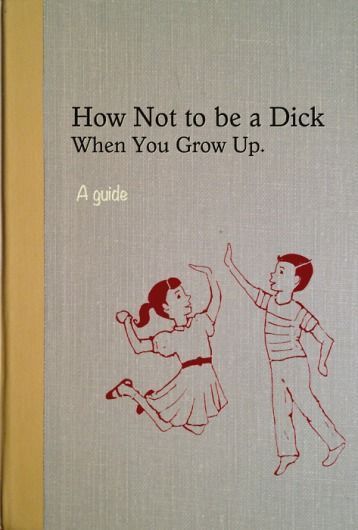Rick Wayne's Blog, page 106
March 11, 2014
Taste My Carnal Chocolate Eruption
I want to tell you a little story.
Picture a restaurant in a small town. In fact, it's the only restaurant for miles around, so almost everyone in the little town eats there at least once a week, not least because of the famous desserts: apple cobbler and cherry pie.
Now picture a horde of rabid lemmings eating the screaming old couple who own the place.
Freak accident. Don't ask.
The couple's eldest daughter, deciding she can't stay in Lemmingville, sells the restaurant to a big conglomerate, which promptly changes the menu. But they understand the popularity of the desserts, which they leave untouched. They simply add a third: Carnal Chocolate Eruption.
As you might expect, sales of both apple cobbler and cherry pie go down. This is foreboding to the City Council, who call a town meeting to discuss "the decline of the community's traditional values," which everyone knows really means a vote to ban the new dessert.
But here's the thing. If you give people more choices, then all other things being equal, the number of selections of any single prior item will go down. Sales of apple cobbler and cherry pie would almost certainly decrease if the conglomerate had added lemon meringue instead of chocolate (although maybe not as much).
It's easy to see where a whole lot of people were probably satisfying themselves with the old desserts, or were skipping dessert altogether, and just never complained. However, it's also possible that everyone in the town still prefers apple cobbler and cherry pie to any other dessert in the world--that if they could only have one dessert ever in their life, it would be one of those. But since they can have more than one, maybe they just want something different from time-to-time.
How you present choice matters to the choosing. For example, there was an article by the LA Times making it's way around the internet recently that suggested 10% of people thought HTML was a sexually-transmitted disease. I doubt it.
First of all, only 80% of households (in the US) have regular access to the internet, so the fact that 90% of respondents didn't think HTML was an STD seems pretty good. But that didn't stop plenty of people from concluding from the article that their fellow humans are stupid. They might be, but if so, that article was NOT evidence for it.
If you ask any group of people a question and provide a list from which they must select their answer, some percentage of people are going to select the most far-out answer just at random. Some others will do it just to be funny. It's really hard to control for these kinds of things--which are called survey artifacts--and you can go get PhDs in various means of combating them. Seriously. (And it's still really hard.)
People see what they want to see, of course, and if you believe the masses are ignorant, if that is your dominant narrative, then you'll see evidence for it all over the place. (And in this case, you'll become one of the stupid masses yourself by getting duped by bogus clickbait "research".)
The same applies to the supposed decline of reading. Those of you who don't hang around writing circles probably don't see it, but LOTS of people bemoan "the death of the reader" or some shit. The murderer is one of the usual suspects: the state of public education, the loss of traditional values, lazy parenting, technology, etc. But they all fall under the same dominant narrative of "the decline of . . .", or her sister, "things were better when . . ."
Bullshit. And you're a cum-farting ignoramus for saying it.
Now, some things are certainly going away. But there is an ocean of difference between change, which is constant, and decline, which requires a normative judgment against a standard. For example, so what if people read fewer books today than in the past? I mean, the mechanical act of seeing words on a page is not a virtue in and of itself. That's fucking ridiculous. Rather it's that the cum-farting bemoaner has in their head a narrative, a normative association between reading and a set of civilization-supporting virtues.
I can demonstrate that this is bullshit without any scientific evidence. All you have to do is realize that there are bemoaners on both the Right and the Left and at every point in between, which means no two bemoaners share the same set of virtues. Just like in the world, people find in art what they bring with them. That's aesthetic philosophy 101.
Virtue is at play in books, good ones anyway, and so books can reinforce virtues, but the virtues themselves come before.
For the hardcore materialists in the crowd, there is plenty of data to support that conclusion. I read a study not too long ago that suggested the total number of words read by the average person in the West--emails, text messages, social media and blog posts, company reports, updates scrolling across the bottom of a cable news broadcast, cat memes, chat messages, dating profiles, advertisements, menus, textbooks, and so on, even works of fiction--is actually going up. Words are everywhere.
The criticism of course is that most of those words are banal, commercial, or both, and do not have the same value as those in a book. And certainly that's true for a lot of them. But peruse that list again. Most of those words are at least informative, and the majority come from other human beings. People share what's important to them, things they find funny or interesting, and we should not be surprised if some of them are banal.
But the criticism belies the bemoaners bias. They claim that sitting alone in a corner reading about imaginary people is superior than interactions with real ones. For the bemoaners, the book is not only better than the movie, it's better than real life.
And that's fine. Really. There's nothing wrong with a personal preference for books over reality. For fuck's sake, I write books! You better believe I read too (although I prefer non-fiction).
But some of these asshats genuinely believe that, because the relative amount of book-reading is going down, the world is in decline. (Or something. The impending evil is often quite muddled. It's hidden in shadow, but by God it's there and you better take heed. They warned you.)
If you go back 150 years, the literacy rate was piss poor. VERY few people in the world could read. (Amazingly, folks managed to be virtuous even then.) If you go back 100 years, literacy was on the rise, but books were hardbound and cost the equivalent of $50 or so. Hence the original push for public lending libraries, which at first weren't widespread outside major metros. (Back then, more people lived in small towns and rural areas than in major cities, the opposite of today.)
The paperback came out in the 1930s. It piggybacked on the cheap printing technology--including a vast distribution network--developed for the periodical industry. Back in the day, average working people read more newspapers, their internet, than books. After the paperback, there was an explosion of book-reading, much of which was serialized in magazines. So yes, measured as a percentage, people read more books back then. A lot more.
But then something amazing happened. People got a choice.
Think about it. In 1960, there were basically three TV channels broadcasting only part of the day and in black and white. If you didn't like what they had on, you could go see a movie, if one was playing at your local theater and if you hadn't already seen it. (Remember, most people did not live in large cities.) Or you could play cards or a board game, the same ones you probably played countless times already because you didn't have a game library in your closet, nor did the local store probably have much of a selection, nor could you afford to keep buying games even if they did.
My grandparents passed the time sitting on their front porch. Seriously. Or they went "calling on" their neighbors, which if you think about it means people were so bored that it was not unreasonable to expect them to have time to chat even if you showed up at their house at random one afternoon. Holy fucking shitschnizzle on a cracker.
Think about the desserts from before. For the longest time, there was only apple cobbler and cherry pie. Now we have Carnal Chocolate Eruption: Netflix, YouTube, DVRs, umpteen different social media platforms, blogs, gaming consoles (with an online library of affordable games), apps on phones and tablets, random internet surfing, podcasts, live music streams, and all the rest, not to mention older media that are still alive and kicking like TV, movies, comic books, and yes even newspapers and radio! And all of it is, in adjusted dollars, a helluva lot cheaper than anything available back in the day.
The conditions that created the boom in paperback book-reading only existed for a relatively brief period of time. In the whole history of mankind, the combination of high literacy, cheap ubiquitous printing, and a dearth of alternatives pretty much only existed from the end of the second world war to the advent of the internet, and even then only in the West.
And yet some would have us believe that reading books (versus any other media) is singularly virtuous. That's bone-chilling stupidity, and I want to stab those people in the throat with an archaic writing implement after beating them with a buggy whip. Really. I mean, it only seems appropriate.
Things are different. Frankly, it's not the end of anything magnificent. It's the beginning of an age when everyone--or almost everyone--can create and distribute their own videos, their own poetry, their own art, and yes, their own books. They can share their creations with other real live human beings, whose are also creating.
Why on earth would you lionize a broadcast-style, three-sizes-fit-all corporate publishing model? It's only unique characteristic was curation, which is a fancy way of saying you let someone in a company somewhere pick what you were going to read for you, which might not be bad if they weren't reflexively trying to pick what they thought you would buy.
Around 10,000 books were published the year Stephen King was born. This year, across all platforms, digital and traditional, all over the globe, that number will be closer to 700,000. And guess what, bitches? This weekend, one of them will be mine.
Long live the Carnal Chocolate Eruption.

Painting by German artist Lilli Hill. Found without buggy whips courtesy of the internet.
March 6, 2014
Musical Sex
I am working on the sequel to "Agony in Violet" and I need a new title. I always loved Whistler's synesthetic naming and deliberately copied him. For example, his famous painting of his mother, which I'm sure all of you have seen reproduced, is not titled "Whistler's Mother" but rather "Arrangement in Black and Gray No. 1," where arrangement refers to that with music.
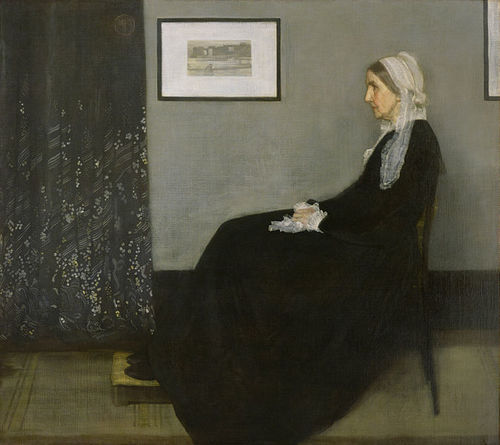
The picture below was first called "The White Girl" but Whistler later changed it to "Symphony in White No. 1". It was his first major work, completed while he was in Paris. The French found nothing to like about the American artist and critics panned the painting, prompting Whistler to leave for London, where he would spend the rest of his life.
His mother would later join him. Widowed, she didn't ask; she simply informed him by post of her arrival date. James Abbott McNeill Whistler was a notorious partier, part of a decadent circle of Victorian writers and artists that included, for example, Dante Gabriel Rossetti. Opium and mistresses were no strangers to his home. It became quite a challenge for Whistler to keep them from his devout (and strict) Christian mother, who infuriated him but whom he supported all the same.
"The White Girl" is on display at the National Gallery in DC. You'll just have to believe me that this image doesn't do it justice. First of all, it's huge, just over seven feet tall. Hung a few feet off the floor, and with those dimensions, it towers over you.

What's more, Whistler attacked his work, literally. Up close you can see it in the brush strokes. He was a violent rebel, as we Americans often are, and was known for his outbursts and for using a paint brush several feet long, which he held in the crook of his arm like a lance. Visitors to his studio remarked how he seemed to fence with the canvas.
And yet the overall composition is serene, probably a statement about innocence lost--the girl stands on a rather menacing animal skin--and it had quite an effect on me, much more so than the Mona Lisa, which I saw in the Louvre as a teenager and which seemed, and still seems, so static and facile as to stir no emotion.
It's fair to say that "Symphony in White No. 1" is part of a handful of paintings that got me into art, and it only seemed appropriate to reference that in the title of my first published work. In fact, "Agony in Violet" was originally entitled "Cacophony in Violet", where cacophony seemed the best musical term for ritual cannibalism, which is the agony in question.
I have been referring to the second Etranger mystery as "Fugue in Rouge", and while I still think that's appropriate to the subject matter--ritual sex in this case--much like my original use of cacophony, I'm not sure fugue will do much but send readers to a dictionary, or, more likely, into the arms of another book entirely, one that is more welcoming.
So the question is, can I find a title the evokes the same imagery, and so remains true to the story, but with less pinky raising?
"Symphony in Scarlet" perhaps? That could also be interpreted as a reference to Arthur Conan Doyle's "A Study in Scarlet", which introduced the world to Sherlock Holmes.
Something with the word vermilion? Or fury?
March 2, 2014
Fantasmagoria full print cover revealed!
And here it is.
Advance copies start going out this week. Print and electronic versions will be released March 16th.
Free review copies are available at any time, now or in the future. Just drop me a note: Rick@DreadfulCafe.com.
And here is one of my favorite quotes from the book. The assassination of famed mobster Nero LaMana, the Butcher of Battle Street, sets off a chain reaction of deadly events, and Jack, the wind-up gunslinger, gets an impossible assignment from his old boss:
“Zeek will tell you all about it. I need you to take her to see Pugs.”
“You collecting the books?”
“You’re damned right I’m collecting the books. That little two-faced aminal works for me now, whether he likes it or not.”
Jack raised an eyebrow. “Does he know that?”
“You’re gonna tell him.”
Jack raised both eyebrows. “He might take exception.”
“Who the fuck cares?” Erasmus screamed from his voice box. “That little rat-dog is a venereal stain, a shit streak on the underpants of the world! You hear me? You get Zeek, you go to that herpes pit Pugs calls a club, and you tell him. You don’t ask. You tell him. Erasmus Pimpernel owns him. I own him and his goddamned books."
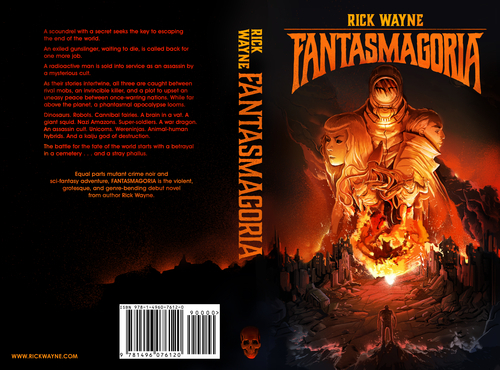
February 27, 2014
Godzilla & Mythic Symbolism (redux)
For those who want some inside information, the "biodroid" at the end of Fantasmagoria is kind of a cross between MechaGodzilla and Mogera.
In the original movie arcs from the 60s and 70s, MechaGodzilla was build by a race of invading aliens who needed to kill the king of the monsters before they could take over the earth. In the 90s-era reboots, MechaG was built by the human race to combat the big guy after he destroyed Mogera, our first attempt at a robotic counterthreat.
In both cases, the machine is the perfect symbolic counterpart to Godzilla, who is another in a long line of elemental giant beasts from the depths, including Cthulhu, the Kraken, the Leviathan of the Bible, all the way back to Tiamat, if you know your Sumerian mythology.
"Depths," by the way, can refer to the ocean, the subconscious, deep space, or anything similar. This is the formless void, the unknowable chaos that exists outside our ken and which must be vanquished for human society to flourish.
And so, in the earliest recorded creation story, Marduk the creator-god (who represents order) slays Tiamat (who represents chaos), an act that must be honored as part of the annual cycle (or eternal return) to ensure the proper continuation of the universe. Civilization over nature.
The same battle manifests in the Lovecraftian mythos as that between sanity and insanity, and you see echoes in Dr. Jekyll and Mr. Hyde, on which Stan Lee based the Hulk.
My character Kraxus the Destroyer is supposed to evoke, albeit very weakly, those great beasts from the depths. I keep it simple so as not to distract from the action, which is more fun both to read and to write.
The 1998 Hollywood production of Godzilla sucked because it ignored the fantastical, mythical elements, which are the core of the character, in favor of a veneer of realism. No depth, mind you. Just a spray-on tan. The creature of that movie is a mutated iguana. No more. No less. And it's destroyed by some F-16s.
Uhhhh... Okay.
In his sixty-year history, the big guy has been both friend and foe, but the best movies--like Godzilla 2000, the first Toho production after the shitty Hollywood version--portray him as neither hero nor villain. He is a force of nature and just as unpredictable. A hurricane may produce tragic results, but it isn't evil. It isn't out to get you, but it is violent and indomitable. You can't beat it. You can only endure.
Fanboys like me frost our shorts in foam when Godzilla--not good, not evil, just indomitable--is turned against a force that IS evil... such as aliens trying to conquer the earth or some mad scientist's experiment gone awry. Humanity may marvel at our ingenuity when we lure Godzilla into a volcano and bury him, but we're kicking ourselves a few months later when the flying saucer drops King Ghidorah from its belly.
A three-headed space dragon. Fuck.
Lucky for us, not even a volcano can hold back a god, the unconquerable and capricious will of nature manifest on two legs. And breathing nuclear fire.
Alien, meet mother nature's bodyguard.
The new Asian trailer for the movie that comes out next week, which I have linked below, is the most exciting thing I've seen in a long time. I just talked like four people's ears off. And now yours.
Spoken in the trailer are the almighty words,
"Can you kill it?"
"I believe something can."
And...
"A monster?"
"No. A god."
And...
"Let them fight" (referring to big G and a second, flying creature).
It appears that this movie will rightfully return the King of the Monsters to his mythical status. I just hope he breathes nuclear fire.
And now I will go back to playing with my Godzilla toys.
RAAAAAAAAAAAAAAAAWR!!!!!
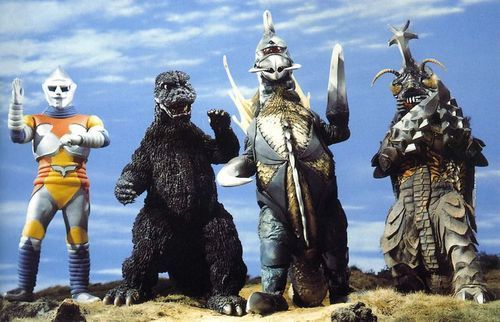
We want the funk! Give us the funk!


Laying it down on the Smog Monster.
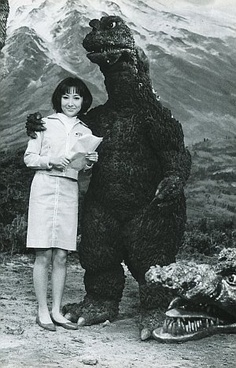
G-man takes a break from saving/destroying the world to pose with the missus.

Pardon me. Would you have any Grey Poupon?
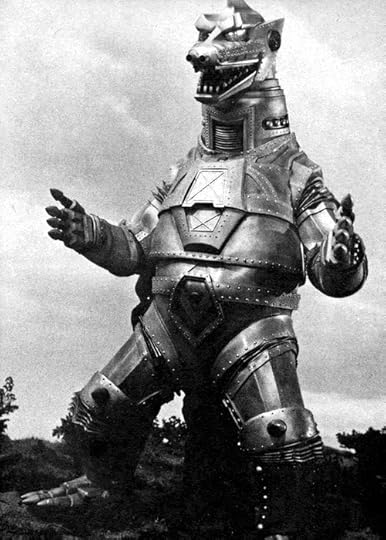
You heard me! You can suck it!
Godzilla & Symbolism
For those who want some inside information, the "biodroid" at the end of Fantasmagoria is kind of a cross between MechaGodzilla and Mogera.
In the original movie arcs from the 60s and 70s, MechaGodzilla was build by a race of invading aliens who needed to kill the king of the monsters before they could take over the earth. In the 90s-era reboots, MechaG was built by the human race to combat the big guy after he destroyed Mogera, our first attempt at a robotic counterthreat.
In both cases, the machine is the perfect symbolic counterpart to Godzilla, who is another in a long line of elemental giant beasts from the depths, including Cthulhu, the Kraken, the Leviathan of the Bible, all the way back to Tiamat, if you know your Sumerian mythology.
"Depths," by the way, can refer to the ocean, the subconscious, deep space, or anything similar. This is the formless void, the unknowable chaos that exists outside our ken and which must be vanquished for human society to flourish.
And so, in the earliest recorded creation story, Marduk the creator-god (who represents order) slays Tiamat (who represents chaos), an act that must be honored as part of the annual cycle (or eternal return) to ensure the proper continuation of the universe. Civilization over nature.
The same battle manifests in the Lovecraftian mythos as that between sanity and insanity, and you see echoes in Dr. Jekyll and Mr. Hyde, on which Stan Lee based the Hulk.
My character Kraxus the Destroyer is supposed to evoke, albeit very weakly, those greats beasts from the depths. I keep it simple so as not to distract from the action, which is more fun both to read and to write.
And now I will go back to playing with my Godzilla toys.

We want the funk! Give us the funk!


Laying it down on the Smog Monster.

G-man takes a break from saving/destroying the world to pose with the missus.

Pardon me. Would you have any Grey Poupon?

You heard me! You can suck it!
February 24, 2014
Sorting the Pebbles of a Mountain
Socrates once asked, is something just because the gods love it, or do they love it because it is just? It's a worthy question, and extensive.
For example, one could also ask, am I against something because it is wrong, or is it wrong because I'm against it? The answer is certainly, it depends, which means we would be wise to reflect when it is one and when the other.
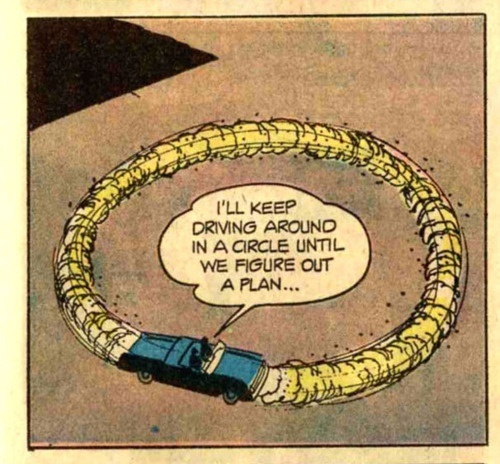
Reflection, particularly self-reflection, takes work. It takes time, too, which means we must pursue it in lieu of something else. To say it another way, self-reflection requires the discipline to practice.
It requires a great deal of practice for it is probably the most difficult mental activity in the world. Not maths. Not philosophy. Certainly not writing.
The evidence is simple. People who are good at all those things still have difficulty with self-reflection. Indeed, the more acclaimed someone is, the more difficult it is to set ego aside.
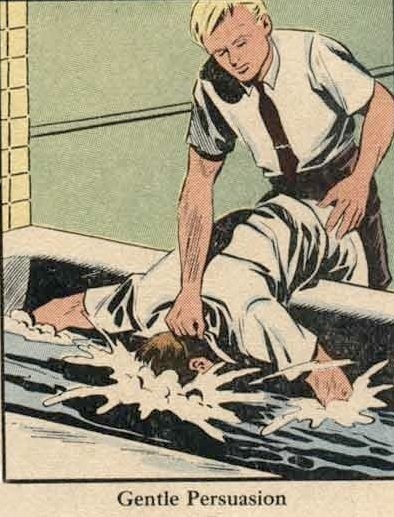
Artists often intend to shock their viewers into a state of reflection. This only ever works within a particular cultural frame. Art that was shocking a thousand, or even a hundred, years ago is droll today.
Where the artist fails, she is pilloried. But this failure is always atomic, individual. Even where groups of people gather with torches and pitchforks, each person's reaction is private.
Success, then, seems a lot like sorting the pebbles of a mountain. It takes time and patience, neither of which I have in abundance.
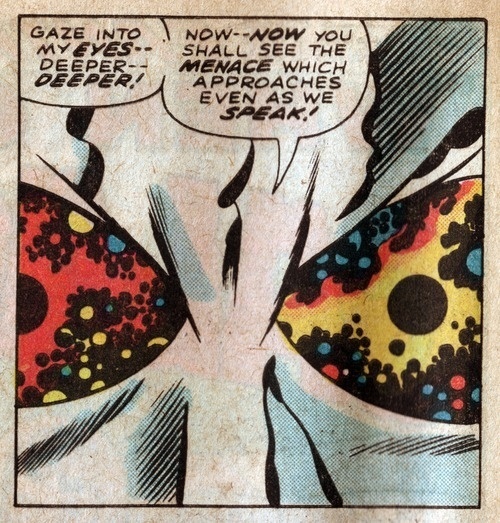
I also have no special talent for self-reflection or the ability to shock others into it, so I am drawn to those who do. They congregate in the visual and performing arts, which is probably why I prefer the company of artists and musicians to my colleagues, who tend towards a suburban progressivism.
And as an introvert, performing presents itself as insurmountable as the sky. I admire--just short of envy--those who are that reckless.
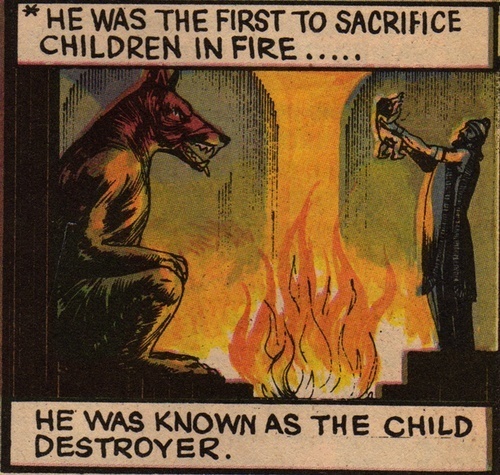
But I'm trying. I'm reflecting on my inhibitions, particularly my fear of failure, because in the end, whether I am writing what the gods love or not is a question only I can answer.
February 11, 2014
In Which I Answer a Stupid Question. Sort of.
I got a pair of related compliments the other day, both persons being impressed at the bat-shit-crazy inventiveness in Fantasmagoria. (Thank you.)
The statements were notable for NOT being followed by, "but why do you have to write about...?" (or in its stronger form as a statement, "I don't see why you have to write about..."), which I am getting more frequently.
This is a stupid question. It's also a little insulting.
Asking why I have to write about a giant vat of semen, or a bag of severed penises, or why I have so much pointless violence, only makes sense on the assumption that there was some alternative that I shot for and missed.
You wouldn't ask, "Jeez Rick, why do you have to modify your nouns with adjectives?" Or, "Why do you have to use so many definite articles?"
It's a subtle attempt to capture the warrant of the argument by assuming right off the bat that penises and pointless violence are bad. If I thought that, then I'd be pretty fucking stupid for writing a book full of them, huh?
I am not Picasso. I am not the Picasso of writing. I am not the understudy-to-the-student-artist-who-lived-next-door-to-Picasso of writing. But imagine how ignorant you would sound if you walked up to the man and asked, "why do you have to paint your people so grotesquely deformed?"
"Uhhhh... I didn't have to, so that probably means I wanted to?" (Actually, by most accounts, Pablo didn't suffer fools well, and he probably would have bitch-slapped you for that question. Yes, I said bitch-slapped.)
Plenty of people aren't going to like my stories. I am not suggesting they should. I am suggesting they should not assume I tried to write to their expectations and shanked it.
I am always going to do a bad job of writing to your expectations. Always. Rather, I am trying with each work to do a better job of writing like that asshole Rick Wayne.
But more to the point, the question is actually kind of insulting because it assumes that I was too stupid to appreciate what I was doing, that I crashed into a school bus full O'children and emerged smiling, that I strayed from the path of Mirkwood, and you, the nosy neighbor, the busybody, are doing me a favor by pointing that out.
"Hey Bob. I just wanted to let you know, what you're doing to your house there, I don't like it."
If you see a competent adult, crayon in hand, coloring like a masturbating chimpanzee, you wouldn't assume they just didn't know to stay inside the lines. You wouldn't wag your finger down at them like you would to a child.
"Now Mr. Jackson, let's be sure to color inside the lines."
"Fuck you, bitch! It's my fucking coloring book. Mind you're own fucking business. Tellin' me to color inside the lines. Say that again and I'ma shove this black crayon so far up your tight white ass that..."
You get the idea. I'm not a child. If I'm coloring outside the lines, it's probably because that's what I intended to do, and even if you suspected I didn't know any better, it's still better to apply the principle of charity. And if you can't say anything nice, then between the two of us, you might not be the mature one. Just sayin'.
If you don't like my shit, don't fucking read it. (I'll get over it... one day.)
